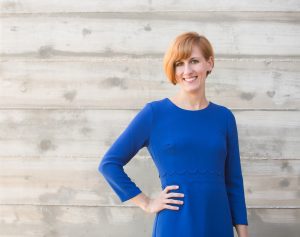Divorce. Addiction. Chronic Illness. Jail. These traumas occur in American life at all societal levels, and they affect the lives of both adults and children every day. When kids are affected by traumatic events, they bring the effects of that trauma with them to school. Depression, anxiety and trauma-induced behavioral challenges impact their ability to learn and their relationships with teachers and peers.
Educational Psychology alumnus Elizabeth Minne, Ph.D. ’06, is helping to provide an outlet for students to deal with some of these issues for Austin Independent School District (AISD) students through on-campus school mental health centers. Vida Clinic, which was founded by Minne, has partnered with AISD to provide on-campus mental health centers with licensed counselors.

Initially implemented at Crockett High School, mental health services have expanded to 18 middle and high schools, and 22 elementary schools. These schools serve students who live in multilingual neighborhoods, many of which have a higher proportion of crime and a lack of transportation. These factors can lead to issues such as disruptive behavior or chronic absenteeism.
The stress that students experience can lead to disruptive behavior in and out of class that can, in turn, lead to suspensions or expulsions. Meeting with a counselor provides a way for students to work through their issues, without relying on punitive measures that help fuel the school-to-prison pipeline.
Vida Clinic helps fill a void that school counselors typically cannot take on. Most school counselors are required to spend the majority of their time supporting students academically—making sure students are earning their school credits and are on track to graduate. The job of Vida Clinic’s clinical therapists is to support student mental health. When counselors encounter students who are struggling emotionally, they can refer students to the on-site clinic for mental health services. Students do not have to travel and miss minimal class time. This also means that parents or guardians do not have to take time off of work to take children to appointments.
A case study from the 2016-2017 school year at Crockett High School offers support that these services benefit the students who participate. Compared to a control group, students in the treatment group exhibited increased attendance, fewer expulsions, and higher academic performance.
Teachers and parents can be involved in a variety of ways, says Minne. “They can participate in individual therapy services for themselves. They can take part in individual consultation services in order to develop trauma-informed strategies for responding to challenging student behaviors. They can participate in small group workshops to develop skills and knowledge of mental health concepts. Or they can attend campus-wide presentations for initial learning of mental health concepts, such as Trauma-Informed Care.”
The on-campus clinics also help destigmatize mental health. When appropriate, therapists can also work with the student’s parents or teachers, taking a holistic approach to mental health.
Providing teachers with resources to deal with disruptive behavior can also help reduce teacher stress. “Teachers can sometimes take disruptive behavior from students personally, when many times the disruptive behavior has less to do with the teacher and more to do with stress or mental health issues the student is facing,” says Christopher McCarthy, a professor in the Department of Educational Psychology at the University of Texas at Austin’s College of Education.
McCarthy and his graduate students have collaborated with Minne for several years to help teachers develop coping resources for classroom stress. They also help improve teachers’ occupational health and allow them to better recognize when students might be experiencing mental health concerns.
Says Minne, “We find that when we have mental health professionals on campuses who are able to provide therapeutic support for everyone, both the adults and the students, the climate begins to shift to one that is more open to talking about mental health. It becomes easier for everyone to acknowledge that mental health is something that we all need to pay attention to. As one teacher told me, ‘It takes a village, we are all in this together.’”

